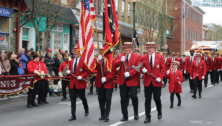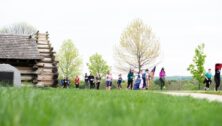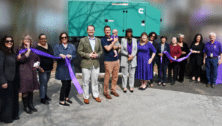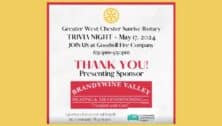Chester County Leadership: Steve and Carol Aichele
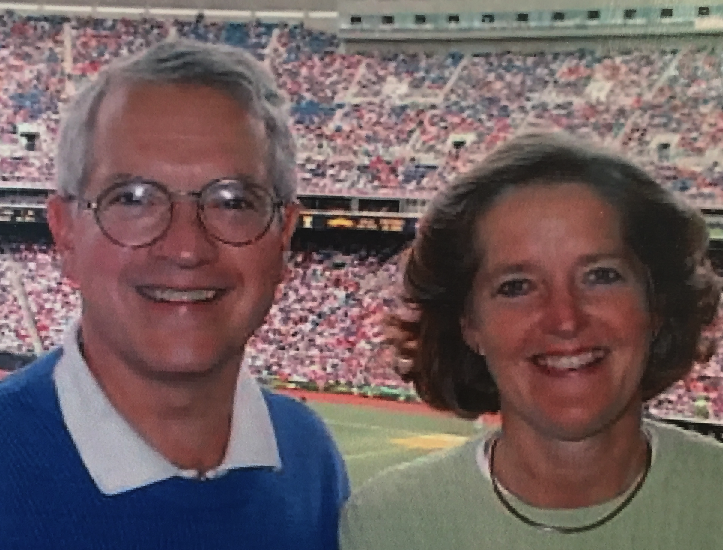
To long-time observers of the Chester County scene, Steve and Carol Aichele need no introduction. Carol is past school board president, county controller then commissioner and Pennsylvania Secretary of State; Steve a Navy captain, a partner at Saul Ewing for 35 years, General Counsel and then Chief of Staff to Governor Tom Corbett and current Chairman of Main Line Health’s Board of Directors.
VISTA Today spoke with Steve and Carol Aichele last month about growing up–he in Lower Merion, she in Elmira, New York–meeting at Cornell, getting married and heading to California and a stint in the Navy, returning to Philadelphia to attend law school, Carol’s decision to take on the entire Tredyffrin-Easttown school board when they closed a neighborhood school she liked, and their current projects including overseeing the transformation of the Paoli transit center.
Where did you grow up?
Carol Aichele: I was born in Elmira, New York, the middle child of three. Members of my family have lived there on the original land since 1796. My father was a pilot for TWA and my mother a stewardess, as they called flight attendants in those days. She is an artist. They met in New York City and moved to Elmira in 1949 during a prolonged TWA strike. While in Elmira, my father agreed to build a house that had been designed by my grandfather, who was an architect. My dad decided he liked building things and started a construction company.
Steve Aichele: I was born in 1948 at Misericordia Hospital in West Philadelphia and spent my first eight years in the 69th Street area of Upper Darby. When I was in third or fourth grade, my family moved to the Penn Wynn area of Lower Merion along Haverford Road. My dad was a college professor before becoming an administrator at Temple. My mother was a stay at home mother who worked hard but didn’t get paid.
What memories do you have of growing up?
CA: The snow in the winter was pretty memorable. And, there were a lot of kids. I had a great time skating on the ponds in the winter and looking for arrowheads down by the river in the summer.
SA: My father was a university professor who didn’t have classes in the summer. After school was out every summer, we would pack up the house and go back to my mother’s family’s dairy farm in Cumberland County. The experience of going to school in Lower Merion and spending my summers on a farm gave me an understanding and a sense of ease in both the world of farming and the professional, educated society of the Main Line.
What was you first job?
CA: I was a gofer for my father’s construction business. We all lived, breathed, ate and slept the small family-owned business. The company had jobs going in a lot of different places, and my father would ask me to call the different union offices to ask about different aspects of the union contracts. I remember calling the Corning Carpenters’ Union one day and telling the gruff sounding union guy who was just trying to get me off the phone that I had the contract in front of me, and his answer didn’t match the agreement.
SA: From the time I could sit on a tractor and reach the steering wheel and push the blocked-gas pedal, I was working on the farm, driving the tractor, dragging bales of hay or stacking them on the wagon.
What lessons did you take from those jobs?
SA: People on the farm work really, really hard and get paid very, very little. I thank my lucky stars every day I work in an air conditioned office and use my brain instead of my back to earn a living.
CA: Owning your own business is not for sissies. It was construction; there were really good times and really bad times. I did learn first-hand the challenges of running a business including finance, payroll, labor unions, suppliers, government reporting.
When did you both realize you had leadership ability?
SA: (Laughing) Carol was born with it!
CA: Even though I’m not sure where I got it, we always joke about my can do attitude. When I was working for my father, one of my jobs was to drive him to the airport. He owned a plane, and when we would get to the airport, he would tell me to drive right up to the hanger. I said I couldn’t drive on the tarmac because the signs said ‘Positively No Admission.’ He said the sign was not meant for me and to drive on. It’s just an attitude we all developed as kids.
Did you play any sports when you were young?
SA: I played baseball on the back lot of what is now Lankenau Hospital. I played shortstop or third base through college and, like every kid, even hoped to play in the Majors. That wasn’t to be. I was a sophomore in college before I realized there was no place in the Major Leagues for a small, slow shortstop.
CA: Believe it or not, I am listed as a “pioneer in women’s athletics” at Cornell. Until the late 1960s, there were no Ivy League “women’s sports.” The Ivies were for men only. Cornell was an “enlightened” Ivy and always admitted women, but just a small percentage. I was one of the first women cheerleaders in 1969. Years later, our daughter, Kate, was sitting in a women’s studies course at Cornell where the lecturer was going through women’s accomplishments at Cornell, and they flashed up my picture. “OMG, that’s my mother!”
What music did you listen to back then?
CA: I didn’t listen to a lot of music, and I still don’t. I remember liking the Fifth Dimension, Billy Joel, and the Four Seasons. At Cornell, I remember seeing on stage Janis Joplin, Judy Collins, and Peter, Paul and Mary. Paul Yarrow went to Cornell.
Why did you decide to go to Cornell?
SA: For me, it was an eighth-grade history teacher named Miss Deubler who told me I was going to Cornell. I got a small engineering scholarship and then went on a Navy scholarship in my second year which I used to pay the rest of the way through Cornell.
CA: My older sister, who went to Hood College, an all-girls school, told me not to go to an all-girls school. I went to Cornell because my father and his father went to Cornell.
1968 was a great time to be in college. What memories do you have?
SA: Not if you were in ROTC, they weren’t good times! It was just nasty. We couldn’t ever wear uniforms without blood being tossed on us. I was brigade commander my senior year, and my roommate was big in the local SDS* chapter! Dave and I would argue like crazy and then go out and get a beer. We’ve remained close over the years. Dave now runs MIT’s nuclear reactor.
CA: Student unrest was very real in the late 1960s. The protests over the war and civil rights were so bad in the spring of my freshman year, the campus closed. The situation between the African America students and the fraternity jocks became so tense that the student demonstrations at Cornell ended up on the front page of the New York Times. My dad wanted me to come home, but I stayed and had one of those learning experiences that you never forget.
How did the two of you meet?
SA: I waited tables at my fraternity house to pay my food bill. One fall night in 1969, I’m waiting tables and opened the door to go out into the main dining room and immediately turned around. I asked the guys in the kitchen who the girl was having dinner with Tucker. Nobody knew. I started asking questions and found out it was Carol Tanner. Turns out, she didn’t want anything to do with a guy like me, a small baseball player waiting tables to pay for his meals, so it took me a while to line up a date. On the night of our first date, we drove to the airport bar outside of town, talked all night and ended up closing the place down at 2:00 AM. The rest is history!
Did you get married right away?
SA: I graduated, and she was still in school. I commuted from Norfolk, where I was stationed, to upstate NY in my 1971 Pontiac LeMans, a nine-hour trip both ways. After a deployment in Europe and time training in Virginia Beach, I asked Carol to marry me.
CA: I visited him in Norfolk one day unannounced. On my way up to the apartment, I picked up his mail. In his stack of mail was a box from “Art Carved,” a well-known jeweler. When Steve answered the door, I handed him the box and asked, “Is this a ring for me?” That’s how he proposed!
Her father liked you, Steve?
SA: I think he did. He called me “Joe” the first time I went to her house for dinner, but otherwise we got along. I lived through a plane crash with him.
A plane crash?
SA: Her father had a twin engine Piper Comanche he used to visit job sites and vendors. I went on one of his trips and on the return trip, the wheel blew when we landed in Elmira. We slewed off the runway and bounced a few times before coming to a stop. He then calmly asked me if I was OK and suggested we get out of the plane in case there was a fire.
So you get married and end up in California. Why California?
SA: The Navy shipped me to Long Beach as an admiral’s aide.
CA: Because we had assigned quarters on the Navy base across the street from the admiral and because I did not want to be the aide to the wife of the admiral, I had to get a job and started teaching middle school math and science in a small parish school just south of the Los Angeles airport.
What brought you back to Philadelphia?
SA: While I was in the Navy and serving as an admiral’s aide, I had the chance to meet and interface with a lot of powerful men that a 24-year-old kid should never have had the chance to meet. A number of people encouraged me to go to law school in California. I thought about it, but Temple was holding a seat for me in their law school, and after looking at other law school options, we decided to come back to Philadelphia.
CA: We came back to Philadelphia, got an apartment in East Falls, and Steve went to law school. Our #2 child, Kate, was born on the day of Steve’s last law school final. After graduation, we moved to Washington where Steve clerked for Judge Robert L. Kunzig on what was then called the U.S. Court of Claims across the street from the White House.
SA: Back then clerking for a federal judge was like finishing school. I started at Saul Ewing in the summer of 1978. Aside from my three years in Harrisburg, I’ve worked for Saul Ewing my entire career.
What kept you at Saul Ewing so long?
It’s always about the people! Most of my best friends are at Saul Ewing. I enjoy going to work there every morning. Plus being a lawyer is endlessly entertaining; you just never know what is coming next.
When did Saul Ewing open up the Chester County office?
The partners didn’t know there was life west of City Line Avenue. Bill Rouse’s development in Great Valley back in 1986 was starting to get noticed in the papers. I had clients in Chester County and, after much deliberation, the senior partners let us open an office out here.
How did you get involved in politics, Carol?
CA: Because I had gone to a backwater public school in Elmira, I wanted a better educational experience for my kids. When we moved from DC to the Philadelphia suburbs, I scouted out elementary schools in Radnor, Lower Merion, and Tredyffrin/Easttown. Because of its strong academic record, and the economic and racial diversity, we eventually settled on Paoli Elementary School. When the district closed the school a year later, a bunch of us parents took up the fight to save the school.
SA: When the school board made the decision to close Paoli Elementary School, Carol made a decision to change the board. We had community meetings and parties and got the ball rolling. I was a Republican committeeman at the time. I recommended that the Republican chair endorse Carol’s effort to defeat the incumbent. The committee wouldn’t listen, not until a couple of weeks before the election when they could see the incumbent was likely to lose. The local party chair was angry at me for allowing my wife to field an opposing candidate and on one phone call, asked, “Can’t you control your wife?” I suggested that he try and handed the phone to Carol. Within a half-hour Carol had won him over.
Taking on an incumbent was a risky thing to do?
CA: It was the right thing to do! The mood in Tredyffrin/Easttown at the time was, “We’ll never be as good as Radnor or Lower Merion.” If you think you’ll never be as good, you probably won’t be. We had great kids and certainly were paying a lot for our public schools, but always came up short compared to our more established neighboring school districts. In 1991, a new superintendent came in who brought in a group of consultants who poked around for two months, searching for the cause. The consultants told us our hiring process was the problem, and we weren’t hiring the best teachers. Good teachers make good students. We set about fixing the district’s hiring process and saw immediate results. By 1996, according to state test scores, Conestoga High School became the “best comprehensive public high school in Pennsylvania.”
How did you move from school board into county government, Carol?
CA: I ran and won a contested county-wide race for a new Republican State Committee seat and got to know lots of political people around the county. In 1997, I jumped into the race for County Controller and won that too.
SA: The Party leaders were unhappy with the incumbent county controller and wanted to find someone to run against him. Neither of the two candidates who wanted to run for controller had county-wide election experience. I thought we could do better and said so. I suggested we create a profile for an ideal candidate and then find someone to run who fit the profile. The group decided the ideal candidate would be a woman, have a background in finance, have county-wide name recognition, and live in the northeast section of the county. Carol fit the profile and was asked to run. The incumbent decided not to seek reelection.
When you served as Secretary of the Commonwealth, and General Counsel and Chief of Staff for Governor Corbett, you were described as the “power couple.” What did you take away from that experience?
SA: When Governor Corbett asked us to serve in his cabinet, Carol and I both quit our jobs and moved to Harrisburg. Leaving private practice and working for the Governor of Pennsylvania was a significant career move for me. It is something we always wanted to do, and if we had passed on the opportunity, we would always have regretted it.
CA: More than ever, I am convinced that local government serves the people of Pennsylvania best. Local officials can and do provide “high quality government services at a reasonable cost” and are accountable.
Looking out over the next six to twelve months, what are your priorities?
SA: I would like to get a couple of things done at Saul Ewing before I retire. For instance, we do Government Relations better than just about any other law firm. But we have never formed a real practice group or marketed our capabilities. We are in the process of turning that around, and I would like to move that along.
CA: It’s nice to be older. There are things you can’t do when you’re 40 years old that you can when you’re 60. Steve is chairman of the board of Main Line Health and heads the task force to design and build the new Paoli Transit Center.
SA: I’ve been working on the Paoli transit site for close to 30 years. We’ll have a new station in Paoli by 2018. My goal is to have it done before it becomes the “Stephen S. Aichele Memorial Station.”
CA: I am now serving on the State Board of Education. They wrote “A Nation at Risk” in the 1980s. We just have to do a better job educating our kids. Over the years, we have tried a lot of new programs and spent a lot of money but, in my opinion, have little to show for it. We need to focus on individual student performance and talk about improving results. Statewide in 2015, seventy percent of Pennsylvania’s eighth graders failed the PSSA math test. In Philadelphia, the percentage was much higher. This is arithmetic! Handy things for adults to know when they’re getting a mortgage or balancing a checkbook.
I am now working in the Center for Community Solutions at West Chester University and doing essentially the same work I’ve done my whole life, but now I have the resources of the university’s administrators, faculty, and students to effect positive change in the communities surrounding West Chester.
What’s the best piece of advice you ever received?
CA: We have three children, and it was always my intent that they would be my finest work…and they are. But I chaffed for twenty years at having to tell people that I was a stay-at-home mom, sometimes dismissed in political circles as “a housewife from Paoli.” I remember telling Dr. Ted Foot, the superintendent of schools in T/E, that I was really bothered that I did not have a job. He stopped me and said, “Carol, you work. You are just not paid.” To this day, his words make me smile.
SA: The one thing I always think about is, anything that doesn’t kill you makes you stronger. That line always gave me the courage to try stuff. We always told our kids to go for it, to reach for things they wanted. What do you have to lose?
________
* Students for a Democratic Society (SDS) was a student activist movement in the United States that was one of the main representations of the New Left. The organization developed and expanded rapidly in the mid-1960s before dissolving at its last convention in 1969.
Connect With Your Community
Subscribe to stay informed!
"*" indicates required fields








































![95000-1023_ACJ_BannerAd[1]](https://vista.today/wp-content/uploads/2023/03/95000-1023_ACJ_BannerAd1.jpg)




